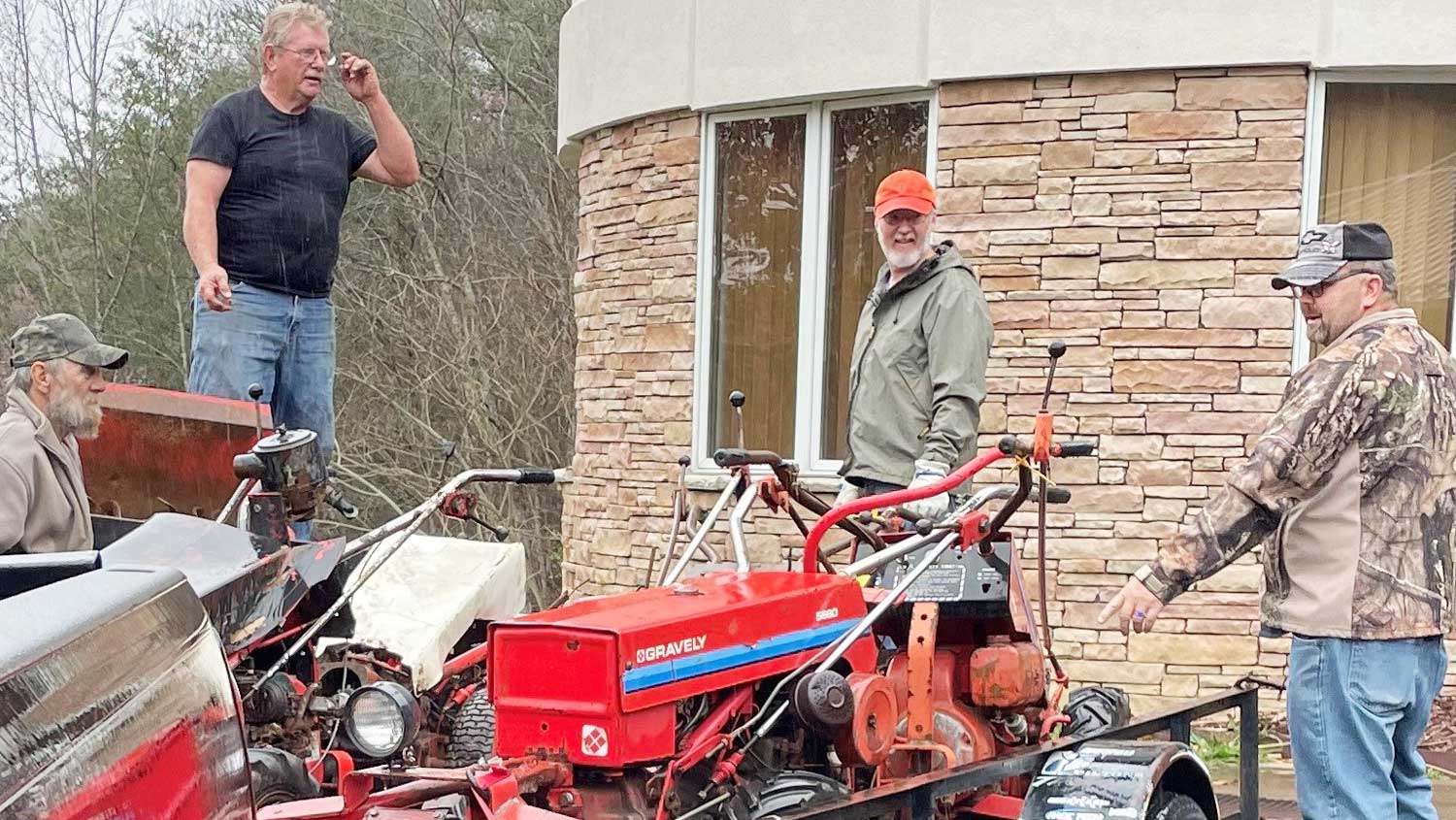
Small farm equipment is loaded onto a trailer in Letcher County to be transported to high school vo-ag programs for repair. (KHC photo).
JAN
Program repairing small farm equipment damaged in Eastern Ky. flood
By Chris Aldridge
Kentucky Ag News
Historic flooding in late July that devastated Eastern Kentucky left Kentucky Horticulture Council (KHC) Executive Director Cindy Finneseth wondering if there was some way her organization could help produce growers in the area recover.
“We struggled with what could we do,” she said. “You want to do something useful.”
Last August, KHC and partner organizations met with stakeholders in the area. Farm damage estimates from 138 producers in the affected region totaled nearly $3.2 million in immediate losses, plus future losses were estimated at more than $1.3 million, mainly in crop and infrastructure losses.
A primary concern is getting local produce growers back into production. Even before the flood, Eastern Kentucky suffered from limited supplies of fresh, high-quality produce from local growers.
“We had heard that some growers were deciding to retire and go out of business because of the flood damage, and we didn’t want that to happen,” Finneseth said. “We wanted to get them back into production as quickly as possible.”
One critical immediate need was identified: inoperable small-scale equipment, such as tillers, chainsaws, and mowers powered by small engines. In early September, KHC launched the EKY Farm Equipment Flood Damage Repair Program to mitigate the impacts of flooding for local producers by coordinating pickup of critical pieces of equipment.
“We could come into a county, collect what equipment was flood damaged, fix it, and bring it back,” Finneseth said.
Several high school vocational agriculture (vo-ag) education programs in Kentucky were contacted to see if they were willing and able to perform equipment service and repair.
“Every school we approached was very interested,” Finneseth said.
The first collection was targeted within the initial five-county region designated a disaster area: Breathitt, Clay, Knott, Letcher, and Perry counties. Twenty pieces of equipment from seven growers were picked up in Breathitt and Letcher and distributed to four high school vo-ag programs in Montgomery County, Robertson County, Spencer County, and Western Hills in Frankfort.
“This really helps the growers, plus the students get engaged,” Finneseth said. “It gives students the real-world experience to, maybe, open their own repair shop or small part-time repair business to pay for college, so it’s win-win all the way around.”
The next hurdle was funding.
“How do we pay for new filters, spark plugs, gas, oil, and grease?” Finneseth said. “We approached (Kentucky) Farm Bureau, and they gave us a generous donation ($25,000) to allow us to do this.
“Some of the equipment has been repaired and is ready to go back, and some of the equipment is not repairable,” she added. “My only concern is not to overwhelm these (vo-ag) programs. They’re not professional commercial businesses.”
As of December, 21 growers had applied to have 58 pieces of equipment repaired. The number of applications has since increased to 25.
“The program has been really well received,” Finneseth said. “As we enroll more growers, we hope to engage with several more vo-ag programs.”
Sixteen pieces of equipment have been delivered to Western Hills and Montgomery County high schools for assessment and repair.
Finneseth is hoping to hold future pickup dates in all five counties that were declared disaster areas. “But water does not stop at the county line, so any farmers in Eastern Kentucky affected by the flooding are eligible,” she noted.
Finneseth was told that Western Kentucky University has a big shop capable of rebuilding large farm equipment such as tractors. She is planning to contact the college to see if it could help.
“Almost every grower had a tractor or trailer lost or damaged,” she said. “Hopefully that will turn into something.”
A secondary need for the growers is hand tools. KHC is working to partner with equipment suppliers such as A.M. Leonard, Premier Horticulture, Tractor Supply, and other businesses to help replace hand tools lost in the flooding or damaged beyond repair. A retail price check of an eight-piece “tool kit” consisting of leaf and straight rakes, shovel, hoe, handsaw, loppers, hand pruners, and trowel costs more than $300.
“Many of those things just washed away,” Finneseth said. “We’re working with local businesses to put together a tool kit of basic, professional-grade hand tools using some (up to $5,000) of the Farm Bureau money.”
Finneseth welcomes anybody interested in participating or volunteering to help. She said donations of parts or money is also appreciated. Contact Finneseth at info@KyHortCouncil.org.
Since the fiscal sponsor of the program is the Kentucky Vegetable Growers’ Association, it is a 501(c)-3 nonprofit organization, making donations tax deductible.

